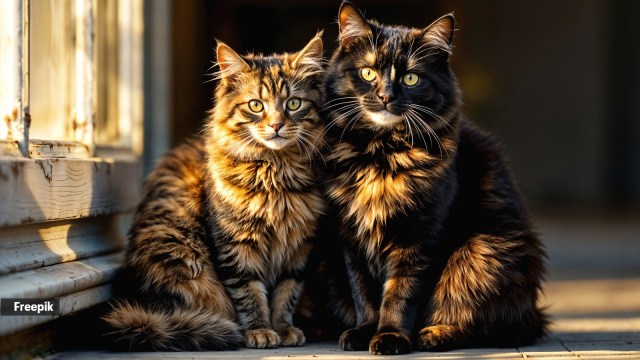📣 For more lifestyle news, click here to join our WhatsApp Channel and also follow us on Instagram
Did you know that cats can develop dementia, too? Researchers find striking similarities with Alzheimer’s in humans
In the early stages of feline dementia, you might see subtle changes in your cat
 Researchers discover toxic protein buildup in cats’ brains, drawing parallels with human Alzheimer’s (Source: Freepik)
Researchers discover toxic protein buildup in cats’ brains, drawing parallels with human Alzheimer’s (Source: Freepik)Cats can develop dementia in a way that closely mirrors Alzheimer’s disease in humans, according to researchers at the University of Edinburgh.
In a study of 25 cats that had shown signs such as confusion, disrupted sleep, and increased vocalisation during their lives, experts found “a build-up of amyloid-beta, a toxic protein and one of the defining features of Alzheimer’s disease,” states a report by the BBC.
Lead researcher Dr Robert McGeachan from the University of Edinburgh’s Royal (Dick) School of Veterinary Studies said, “Dementia is a devastating disease — whether it affects humans, cats, or dogs.” He also described the findings as highlighting “the striking similarities between feline dementia and Alzheimer’s disease in people,” opening new possibilities for understanding and treating the condition.
The research team discovered that the toxic protein was present in the synapses, the tiny junctions between brain cells that carry messages. Loss of these synapses is a hallmark of reduced memory and thinking abilities in humans with Alzheimer’s.
So, what early behavioural changes in cats might signal the onset of dementia, and how can pet owners distinguish these from normal ageing?
Dr Deepraj Prajapati, senior veterinarian at RD Pet Hospital, Ambedkar Nagar, tells indianexpress.com, “In the early stages of feline dementia, you might see subtle changes such as a cat appearing disoriented in familiar spaces, forgetting where their litter box is, or vocalising at unusual hours. While senior cats may naturally slow down with age, dementia-related behaviours are often marked by confusion and inconsistency rather than a steady, predictable decline.”
He continues, “For example, an older cat may nap more often but still follow their routine, whereas a cat with cognitive decline might seem to forget daily patterns altogether. Tracking these changes over time and noting any increase in anxiety or restlessness can help distinguish between normal ageing and a potential neurological issue.”
 Feline dementia shares striking similarities with human Alzheimer’s in terms of brain pathology (Source: Freepik)
Feline dementia shares striking similarities with human Alzheimer’s in terms of brain pathology (Source: Freepik)
Contribution to advances in human Alzheimer’s treatment without invasive testing on live animals
Feline dementia shares striking similarities with human Alzheimer’s in terms of brain pathology, Dr Prajapati states, particularly the buildup of certain proteins linked to cognitive decline. “Studying naturally occurring dementia in cats provides a unique opportunity to observe disease progression without creating artificial models or subjecting animals to invasive experiments. By comparing neurological imaging, behavioural patterns, and post-mortem brain tissue from cats to human data, researchers can identify shared pathways that may lead to earlier diagnostics and targeted therapies in both species. This cross-species insight could help refine treatments while keeping animal welfare front and centre,” notes the expert.
Practical steps cat owners can take to improve the quality of life for pets showing signs of cognitive decline
Creating a stable and predictable environment is one of the most powerful ways to help a cat with cognitive decline. Dr Prajapati notes, “Consistent feeding times, minimising changes in furniture layout, and using clear cues such as night lights can reduce disorientation. Mental enrichment, like gentle play sessions or puzzle feeders, can stimulate remaining cognitive functions.”
He adds, “A balanced diet, rich in omega-3 fatty acids and antioxidants, may support brain health. Regular vet check-ups are vital, not only to track progression but also to manage any secondary health issues that might exacerbate confusion. Small adjustments made with patience and empathy can make a significant difference in the comfort and happiness of an ageing feline.”
📣 For more lifestyle news, click here to join our WhatsApp Channel and also follow us on Instagram



- 01
- 02
- 03
- 04
- 05
























